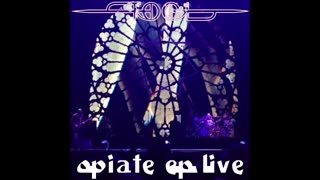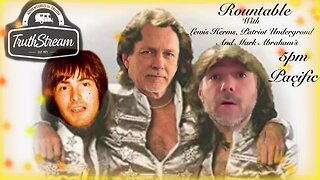Premium Only Content

Deftones - White Pony (Full Album)
White Pony is the third studio album by the American alternative metal band Deftones, released on June 20, 2000, through Maverick Records. It was produced by Terry Date, who produced the band's first two albums, Adrenaline (1995) and Around the Fur (1997). Recording sessions took place between August and December 1999 at Larrabee Sound Studios in West Hollywood and The Plant Recording Studios in Sausalito, California.
The album marked a significant growth in the band's sound, incorporating influences from post-hardcore, trip hop, shoegaze, progressive rock, and post-rock into the alternative metal sound which they had become known for.[1][2] White Pony was also the first recording to feature Frank Delgado as a full-time member of the band on turntables and synthesizer; Delgado had previously worked with the band as a featured guest on their first two albums, producing sound effects on some songs. It was also the first Deftones album which Chino Moreno began to contribute rhythm guitar parts.
Upon its release and retrospectively, the album was met with critical acclaim, and is regarded by fans and critics alike as one of the band's most mature outings at that point.[3][4][5][6] The album includes two successful singles ("Change (In the House of Flies)" and "Back to School (Mini Maggit)"), the promotional single "Digital Bath", as well as the 2001 Grammy Award-winning track for Best Metal Performance, "Elite". The album received a 20th anniversary reissue, packaged with Black Stallion, a companion remix album of White Pony, in December 2020.[7][8]
Background and recording
After a break from touring, the band spent four months in the studio writing and recording White Pony with producer Terry Date, the longest amount of time they had dedicated to an album thus far.[9] Frontman Chino Moreno explained that the majority of this time was spent trying to write songs, and that the writing of "Change (In the House of Flies)" was the turning point where the band began working as a unit.[9]
Despite being pressured to release the album sooner, the band decided to take their time making the album. Bassist Chi Cheng explained, "We didn't feel like we had anything to lose, so we made the record we wanted to make." Moreno did not have an overall lyrical theme in mind, but made a conscious decision to bring an element of fantasy into his lyrics, explaining, "I basically didn’t sing about myself on this record. I made up a lot of story lines and some dialogue, even. I took myself completely out of it and wrote about other things. Once I did that I was able to sing about anything I wanted to, I could be a lot more general. There’s a lot of stuff on this record that people are going to question me about, and I can just remove myself from it. It’s not me. I’m writing a story here."[9] Moreno later claimed in a 2020 interview that his decision to play rhythm guitar on the album caused tensions to escalate with Carpenter during the writing process. Despite the tensions, Moreno and Carpenter found themselves on friendlier terms and found a cohesive songwriting process for most of the album's tracks, with Moreno claiming “Initially, I don’t think the idea was that I was going to actually play on the record, even. Then I remember Stephen specifically saying, ‘Dude, if you’re going to play it in practice, then you’re going to play on the record!’ and I was like, ‘Oh, okay… If that’s cool with you!’ I don’t think he was too happy about it, to be honest, then [...] I do remember us both smiling at each other when we were sitting listening to the track being made, and the fusing of both our guitars, the sound of it, the way that Terry [Date] produced it”.[10]
Although the band initially did not intend to include guest musicians on the album,[9] it features additional vocals by Maynard James Keenan (Tool, A Perfect Circle) on "Passenger" and Rodleen Getsic (simply credited as Rodleen) on "Knife Prty".[11] "Rx Queen" also features vocal contributions from Stone Temple Pilots frontman Scott Weiland, though he is uncredited. Weiland brought Moreno to his studio for collaboration, where he would sing along and suggest vocal harmonies; the result was left in the final version of the song, and credit for Weiland's part was never discussed by either party.[12]
Composition
Some of this section's listed sources may not be reliable. Please help improve this article by looking for better, more reliable sources. Unreliable citations may be challenged and removed. (August 2023) (Learn how and when to remove this template message)
Faith No More have been recognized as an influence on the music of White Pony
Stylistically, White Pony combines the band's standard alternative metal sound,[13][14][15] influenced by bands such as Tool, Faith No More, Nine Inch Nails, and Pink Floyd, with the layered atmospherics of The Cure, specifically their Pornography era.[15][16] It has also been categorized as an art rock[17] and nu metal album,[18] though several critics also acknowledge that the record moved beyond the latter label.[1][19][20] Metal Hammer likened the album to a metal version of Radiohead's critically acclaimed OK Computer (1997).[21] The original opener for the album, "Feiticeira," lacks conventional song structure and builds over a background of guitars and bass.[22] Moreno discussed the lyrics to the song: "The name Feiticeira is some Portuguese name that I read in a magazine and just liked. It's based on the scenario of being taken captive. It's completely fictional. I want that people who listen to it feel like they are the ones in the situation. Because of that I sing it in first person. It's up to people to figure out if i'm having fun (with them) or not, even though it sounds a bit eerie". "Digital Bath" features a trip hop drum beat with Moreno's vocals over heavy two-guitar trade-offs and a more atmospheric texture from Delgado.[22]
"Elite" is more straightforward and heavy and lacks typical Deftones dynamics, containing industrial rock influences.[23] Moreno said that the song "is laughing at everybody trying to become what they already are. If you want to be one of the elite, you are".[23] "Rx Queen"' contains heavy percussive effects and stuttering bass.[22] Moreno considers it "the most futuristic song in the album".[23] On "Street Carp", after a brief guitar introduction, the band crashes in with full force.[22] Moreno said: "It's a classic Deftones song, with a rolling riff and some really interesting chords in the chorus. The vocals are kinda crazy - I'm singing out loud over the top of the music, like (The Smiths front man) Morrissey or something, a cool contrast".[23] Although the song was not released as a single, a promo video was made for it.[24] "Teenager" consists of an acoustic riff and a "scratching" line with a trip-hop beat and glitch influences. The song deals with a youthful romance coming to an end.[22] Moreno stated that he wrote the lyrics when he was 15 after a first date and that it was originally a Team Sleep song.[23]
White Pony features guest vocals from Scott Weiland (left) on "Rx Queen" and Maynard James Keenan on "Passenger"
The opening chords for "Knife Prty" lead into a distorted introduction with a moving bass line and a vocal bridge sung by Getsic in Spanish-Arabic style.[22] Chino said, "It's a seductive song with a lot of violent imagery. People don't tend to like sex mixed with violence. The mid section has amazing vocals from a girl called Rodleen who worked next door to our studio".[23] An atmospheric, heavy song with a bleak guitar line and a bridge featuring a subtle scratch solo by Delgado, "Korea" is considered one of the album's highlights.[22] "Passenger" features a guitar intro and vocal interplay between Keenan and Moreno alongside piano and keyboard lines, leading to heavy guitar that introduces the choruses.
"Change (In the House of Flies)" was the album's lead single, and became a radio hit.[22] Moreno compared it to earlier single "Be Quiet and Drive (Far Away)", considering it "a beautiful metamorphosis".[23] The closer, "Pink Maggit" is a "brooding, surreal epic" which ends with a recorded heartbeat.[15][25] The title is a reference to a line in the Dr. Dooom song "No Chorus" on the album First Come, First Served which mocks Nas.[26] Leading off the reissued version of the album, "Back to School (Mini Maggit)" is a reinterpretation of the album's closer with additional rap or hip hop influences.[15] Moreno at first appreciated the support the band received from the label as a result of recording the track,[27] but later declared that he regretted the creation of the song and its placement on the album.[15] "The Boy's Republic" is a song exclusive to the limited-edition releases of the album, with lyrics about someone desperately seeking redemption, and comes after "Pink Maggit," making it the final track on the limited edition.[28]
Album title
"White pony" is street slang for cocaine. However, there are other meanings for the album name, including a sexual reference, as explained by Moreno:
"There's a lot of different references for White Pony. One of them is a cocaine reference and there's a lot of stuff... have you ever heard stuff like in dream books that if you dream about a white pony, then you're having a sexual dream? There's a lot of stuff that kinda goes around it. And there's an old song [that goes], 'Ride the white horse.' That's obviously a drug-reference song." White pony also refers to high grade pure heroin. Heroin is sometimes referred to as “horse”, the uncut white heroin is “white pony”[29]
Release
Upon release, White Pony debuted at No. 3 on the Billboard 200 below Britney Spears' Oops!... I Did It Again, selling 178,000 copies in its first week.[30]
White Pony is Deftones' highest-selling album to date, being certified gold on September 7, 2000, and eventually the album became their first platinum record certified by the RIAA on July 17, 2002.[31]
Five different editions of the album exist. On its release date, limited-edition numbered copies were released with solid red and black jewel cases. The two differently colored cases also featured different booklet inserts. Both limited-edition versions included "The Boy's Republic" but not "Back to School (Mini Maggit)."
The edition with a gray cover was released as the initial non-limited version of the album and did not include "The Boy's Republic". This, along with the red and black versions, were the properly sequenced version of the album as the band intended. The gray version was later superseded by the current white version, which added "Back to School (Mini Maggit)" as the first track. This was only added as a marketing strategy, a decision that Moreno stated that he was unhappy with.[32][33] The original release was also pressed on clear red vinyl for a promotional run of about 1,000 copies.
In honor of the album's 20th anniversary, Deftones re-released White Pony on December 11, 2020, packaged with Black Stallion, a bonus remix album.[7] Black Stallion features the full track list of the original White Pony album in order with each song recreated by a different producer with an "electronic, beat-driven" approach. Deftones originally conceived of doing a remix album prior to the recording of White Pony and had reached out to DJ Shadow to remix the entire album himself.[8] Black Stallion includes remixes from DJ Shadow, Clams Casino, Robert Smith, Mike Shinoda and more; and was promoted with a music video for Purity Ring's remix of "Knife Prty".[7]
Track listing
All tracks are written by Deftones (Stephen Carpenter, Chi Cheng, Abe Cunningham, Frank Delgado, Chino Moreno) except Passenger, written by Deftones and Maynard James Keenan
White Pony original edition (gray cover) track listing[11]
No. Title Length
1. "Feiticeira" 3:09
2. "Digital Bath" 4:15
3. "Elite" 4:01
4. "Rx Queen" (featuring Scott Weiland) 4:27
5. "Street Carp" 2:41
6. "Teenager" 3:20
7. "Knife Prty" 4:49
8. "Korea" 3:23
9. "Passenger" (featuring Maynard James Keenan) 6:07
10. "Change (In the House of Flies)" 4:59
11. "Pink Maggit" 7:32
Total length: 48:43
-
 39:34
39:34
FullxXxAlbums
3 months agoTool Opiate EP Live Expanded (Redux)
3221 -
 LIVE
LIVE
Melted Mind
4 hours agoSplit Gate 2 with the boys
62 watching -
 2:25:24
2:25:24
vivafrei
17 hours agoEp. 266: SCOTUS Allows Trump TPS Revocations! Glenn Greenwald-Gate! Alex Jones! Trans Madness & MORE
146K172 -
 10:51:28
10:51:28
SpartakusLIVE
13 hours agoNEW Easter Egg, SPECIALIST || Duos w/ @GloryJean followed by quads later!
65.3K2 -
 1:39:21
1:39:21
Sarah Westall
10 hours agoRemote Viewing the Future: Quantum, Financial Reset, Transhumanism & more w/ The Future Forecasters
112K33 -
 2:18:42
2:18:42
TheSaltyCracker
10 hours agoUkraine Pokes The Bear ReeEEEStream 06-01-25
137K373 -
 2:45:56
2:45:56
IsaiahLCarter
11 hours agoAPOSTATE RADIO 016: WPATH's Pseudoscientific Insanity (feat. Mia Hughes)
69.6K1 -
 9:14:11
9:14:11
TheBeardedNerdd
10 hours ago🔴 LIVE- (Tarkov) Gaming with CRGOODW1N Streamer/Creator W/ @SelfmadeGGs
44.1K -
 2:11:47
2:11:47
TruthStream with Joe and Scott
1 day agoRoundtable with Lewis Herms, Mark Abrahams and Patriot Underground live #435
67K10 -
 4:33:49
4:33:49
EricJohnPizzaArtist
5 days agoAwesome Sauce PIZZA ART LIVE Ep. #49: Rumble Gaming Night featuring Scottish Viking Gaming!
58.2K4